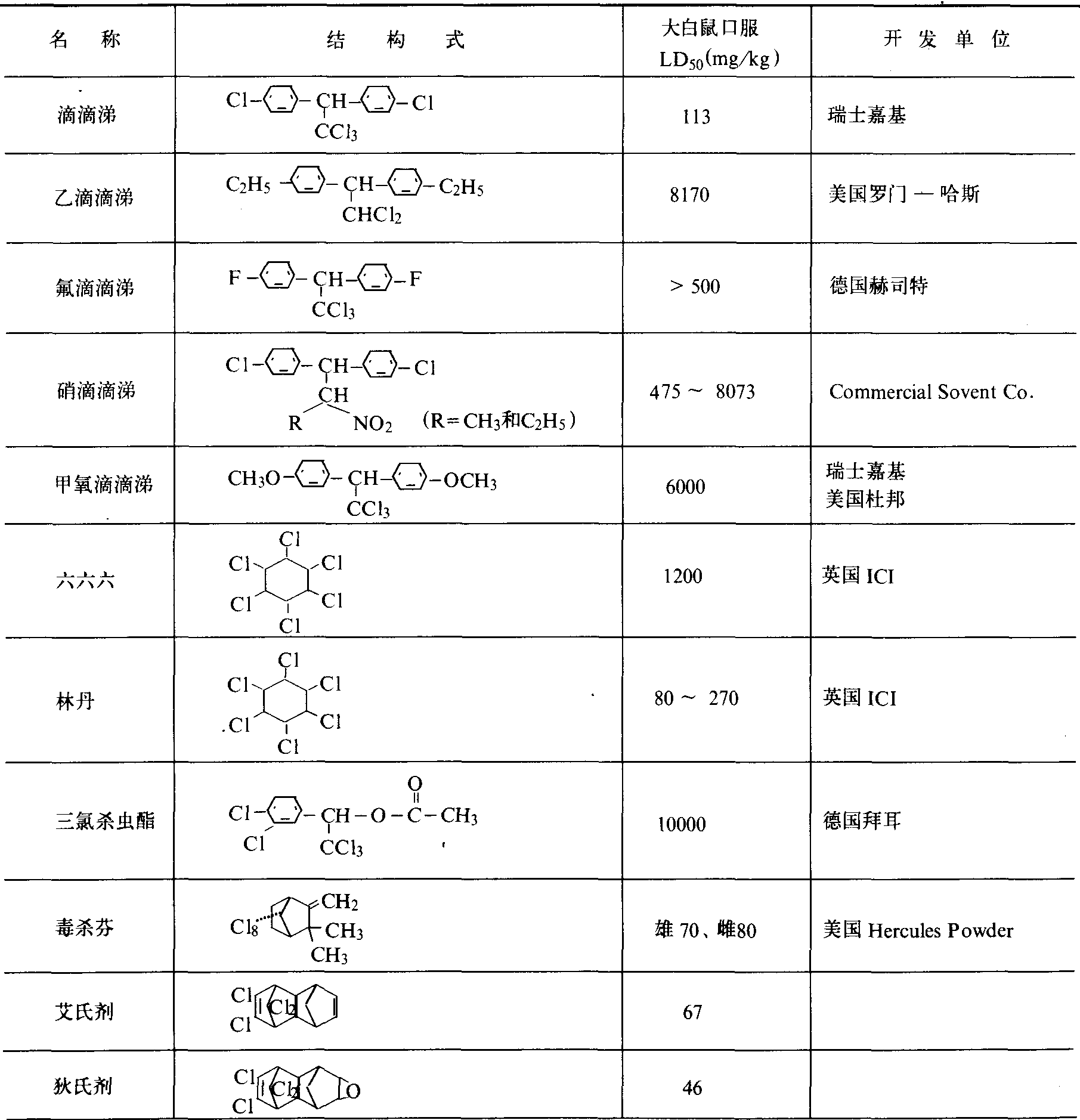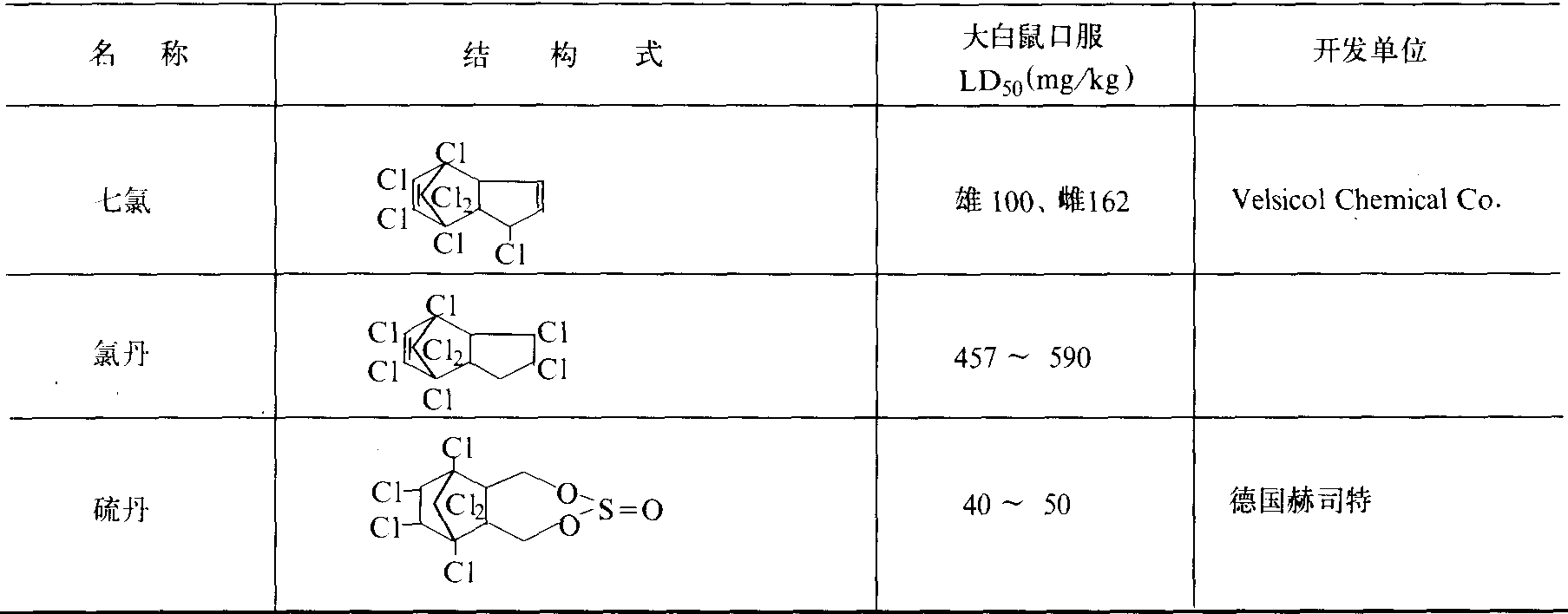有机氯杀虫剂organ ochlorines insecticides
一类含氯有机合成杀虫剂,也是发现和应用最早的一类人工合成杀虫剂。20世纪40~ 70年代,在全世界广泛使用,在防治农林、卫生害虫方面,发挥过重大作用。70年代后,大部分品种相继被限用或禁用。
简史 有机氯杀虫剂主要是滴滴涕(DDT)和六六六(BHC)。滴滴涕是1874年德国蔡德勒(D.Zeidler)合成的,但其杀虫活性却是瑞士缪勒(P.Muller)于1939年间才发现的。1940年,瑞士嘉基(Geigy)公司开始生产。在第二次世界大战期间,广泛用于灭虱和灭蚊,对控制斑疹伤寒和疟疾的传播起了重大作用,挽救了几千万人的生命。六六六为1825年由法拉弟(M.Faraday)首先合成。1912年荷兰凡· 德· 林登(Van der Linden)发现六六六为含四个同分异构体——甲、乙、丙、丁的混合物。后来又陆续发现了另外三种同分异构体和少量七氯和八氯环己烷。1941年英国和法国先后发现了它的杀虫活性。英国卜内门(ICI)公司在40年代进行了系统的开发工作,证实丙体活性最高。为纪念林登,特把含丙体99%以上的六六六命名为林丹。滴滴涕和六六六一样,在40~70年代,也是世界上吨位最大,使用最广泛的杀虫剂,在防治农林害虫和卫生防疫方面发挥过重大作用。
20世纪40年代后期到50年代初期是有机氯杀虫剂大发展时期。这期间开发的类似DDT品种有:乙DDT(pherthane)、氟DDT(DFDT),硝DDT(dilan)、甲氧DDT(methoxy chlor)等。但其使用的范围和吨位,都远不如DDT,而其稳定性都较滴滴涕差,速效性较快,残效性较短,对环境污染轻。同期出现的重要品种还有以松节油为原料的毒杀芬,以环戊二烯为原料的艾氏剂、异艾氏剂(isodrin)、狄氏剂、异狄氏剂(endrin),七氯(heptachlor)、氯丹(chlordane)、硫丹等都曾在世界范围内广泛使用。由于大多数有机氯杀虫剂活性稳定,大量广泛应用后,也产生了一系列问题,如造成环境污染、破坏生态平衡,以及通过生物链浓缩,对人畜可能产生慢性中毒,甚至进入人奶或牛奶中,对婴儿的健康造成潜在危害。因此早在1963年美国卡森(Rachel Carson)女士,在她的《寂静的春天》一书中就提出了警告。尽管对有机氯杀虫剂的致突变、致畸、致癌作用,还有不同看法,但出于对人体健康的高度重视,对改善环境生态的强烈愿望1970年前后,许多国家都颁布了禁用或限制使用有机氯杀虫剂的规定。只有少数品种,如甲氧滴滴涕、三氯杀虫酯(acetofenate)等,不污染环境,没有累积毒性,还在广泛应用。
在中国,1944年开始合成滴滴涕,1946年有少量试生产,1950年正式在泸州化工厂大量生产。六六六合成研究始于1949年,1951年投入工业化生产,品种不多。但80年代以前,却在杀虫剂中占很大比重在控制农林害虫,如蝗虫、小麦吸浆虫、水稻螟虫、果树实心虫、棉花害虫等及防治卫生害虫,跳蚤、虱子、蚊蝇等都发挥了巨大作用。直到1983年全面禁止生产和使用。目前高丙体六六六可以在防治森林害虫和一些土壤害虫中使用。
品种类型 通常根据生产原料不同,把有机氯杀虫剂可分化为: 以苯为原料的品种,如滴滴涕、六六六等; 以炼焦副产品环戊二烯为原料的品种,如氯丹、七氯、艾氏剂、狄氏剂、硫丹等; 以林业副产品松节油为原料的品种,如毒杀芬等。(见表)
有 机 氯 杀 虫 剂 品 种

(续)

特征 可归纳为两方面: ❶大部分品种生产原料易得,成本低廉,生产工艺比较简单,杀虫谱广,残效长。
❷一般性质稳定。在水中溶解度小,在脂肪中溶解度极高,不易分解,残留时间较长,易造成环境污染。并能通过生物富集与食物链在动物体内累积,对人类健康带来隐患。
有机氯杀虫剂
指用于防治害虫的含氯有机化合物。化学性质稳定,难降解,易污染环境。酯溶性大,易在人畜体内积累,对有益生物杀伤力亦大。某些品种,如六六六、滴滴涕在国内已停止生产,并逐渐停止使用。
有机氯杀虫剂organochlorine insecticide
含氯碳氢化合物的杀虫剂。它们是最早(1939)开发的有机合成杀虫剂。分为两类:第一类是以苯为原料如DDT及六六六;第二类是以炼焦副产品环戊二烯为原料如氯丹、七氯、艾氏剂、狄氏剂、硫丹、碳氯特灵、灭蚊灵、开蓬及毒杀酚等。这类杀虫剂由于性质稳定,在环境中不易降解,并且通过食物链在人和动物体内富集,是高残毒农药,70年代中期世界各国相继停止生产或限制应用。